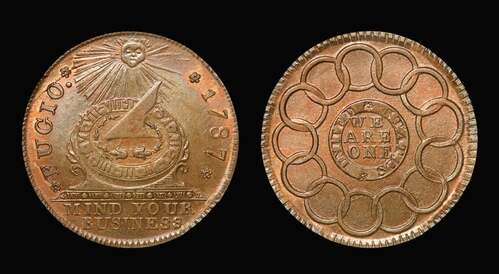September 18th, 2024
by Jonathan Richerson
by Jonathan Richerson

Economists tell us that The Federal Reserve is preparing to report today its first interest rate cut since March 2020. They guess between a 0.25 or 0.5 percentage point reduction. Financial folks tell us that this could mean cheaper borrowing at the bank, credit card balance relief on interest, lower returns on savings accounts and the potential for even lower rates in the months to come. So, what does all this mean to the average person; not much. All of the major news programs have this as a top story, but few of them are able to put these changes into terms most Americans understand. Coming from a banking family, it is at times like this that I like to remind myself of the history of money in our country. Although I might not have the insight and experience of a Wall Street pro, I do have a working knowledge and real interest (dad joke) in money. What I find interesting (last one), is the history of currency.
Most nations take great pride in their currency, as it is a symbol of their strength, stability and history. America produced its first official coin in 1787. At this point we had no “Founding Fathers,” no official mottos, no symbols or history. So, what do you put on your first coin? How do you tell the world what this new nation is about? Our first coin was called a Fugio cent and featured a sundial on the obverse and a chain of 13 links on the reverse. https://www.usmint.gov/learn/history/us-circulating-coins, but it is what was written on the coin that gives us a better idea as to what our leaders at the time were thinking.
Designed by Benjamin Franklin, the face of the coin featured a tiny face of the Sun, looking down at a giant sundial. Letters spelled out the word "FUGIO" (which is why the coin is known as the Fugio cent). Fugio is Latin for "I fly," so the coin was reminding everyone that time flies—and possibly that money flies, since time is money. At the bottom are the words, "Mind Your Business." The obverse did not bear the words "In God we trust"; that slogan wouldn't appear on coinage till after The Civil War. Instead, it had the motto “We Are One” in the center of thirteen interlocked rings.
A casual observer of US history could no doubt get most of the meanings behind the symbolism in Franklin’s first official coin. The 13 rings, the sundial for time and FUGIO, “time” flies. In Poor Richard’s Almanac (1773), he wrote, “A penny saved is two pence clear.” It is the meaning of the phrase “Mind Your Business” that might have been lost with time. In the age we live in, and how the term “mind your OWN business” is being used in the political world today, the importance of Franklin’s message on the first coin could be missed.
He believed every person should be responsible for their own character building. Within his desire for personal development, in 1726, at the age of 20, he created a system to develop his character called: The Thirteen Virtues www.thirteenvirtues.com. He believed people should dedicate a week to practicing each of these respective virtues. After thirteen weeks, when each virtue has been practiced, the cycle begins anew, and this happens four times a year. Franklin believed if each person focused on these virtues for an entire week, four times per year, they would surely progress in business and life. It was clear that he believed if each person did their fair share, society would be better off. The actions of one can have a positive or negative impact on the whole. https://fee.org/articles/the-hidden-message-on-ben-franklin-s-fugio-cent/#:~:text=Inscribed on the coin: Mind Your Business. By,work,” or, “Time flies, so use it wisely!”
It's sad how our society is abandoning this truth. In this heated political climate, politicians tell us that we can weave in and out of personal responsibility when it comes to individual preference. “Mind your OWN business” works for somethings, but if we really are interlocking rings, then we all must “Mind YOUR Business.”
Franklin would have been the first one to agree that government should stay out of a citizen’s personal affairs (founding father dad joke, sorry I lied), but he also recognized how the missteps of one could bring down an entire community. His Thirteen Virtues also acknowledge the fact that virtue did not come naturally to people. Franklin wasn’t much of a church goer, but he did recognize the truth that Paul wrote of in Romans 3:23 – for all have sinned and fall short of the glory of God. All of us are lost, and the selfish desires within us must be addressed. If only Franklin had spent more time on verse 24: and all are justified freely by His grace through the redemption that came by Christ Jesus, I guess we might have had “In God We Trust” imprinted on our currency much sooner.
Today, recognize the gravity of your actions on others. We have personal responsibility while living in a community with others. There is a line between personal choice and selfish destruction of society. We should be able to determine this without the government passing a law. There is a nod to this on the first coin! More so, God has called us to recognize and take action to address this truth.
Then the Lord said to Cain, “Where is your brother Abel?” “I don’t know,” he replied. “Am I my brother’s keeper?” Genesis 4:9
Serving the Savior,
Bro. Jonathan
Most nations take great pride in their currency, as it is a symbol of their strength, stability and history. America produced its first official coin in 1787. At this point we had no “Founding Fathers,” no official mottos, no symbols or history. So, what do you put on your first coin? How do you tell the world what this new nation is about? Our first coin was called a Fugio cent and featured a sundial on the obverse and a chain of 13 links on the reverse. https://www.usmint.gov/learn/history/us-circulating-coins, but it is what was written on the coin that gives us a better idea as to what our leaders at the time were thinking.
Designed by Benjamin Franklin, the face of the coin featured a tiny face of the Sun, looking down at a giant sundial. Letters spelled out the word "FUGIO" (which is why the coin is known as the Fugio cent). Fugio is Latin for "I fly," so the coin was reminding everyone that time flies—and possibly that money flies, since time is money. At the bottom are the words, "Mind Your Business." The obverse did not bear the words "In God we trust"; that slogan wouldn't appear on coinage till after The Civil War. Instead, it had the motto “We Are One” in the center of thirteen interlocked rings.
A casual observer of US history could no doubt get most of the meanings behind the symbolism in Franklin’s first official coin. The 13 rings, the sundial for time and FUGIO, “time” flies. In Poor Richard’s Almanac (1773), he wrote, “A penny saved is two pence clear.” It is the meaning of the phrase “Mind Your Business” that might have been lost with time. In the age we live in, and how the term “mind your OWN business” is being used in the political world today, the importance of Franklin’s message on the first coin could be missed.
He believed every person should be responsible for their own character building. Within his desire for personal development, in 1726, at the age of 20, he created a system to develop his character called: The Thirteen Virtues www.thirteenvirtues.com. He believed people should dedicate a week to practicing each of these respective virtues. After thirteen weeks, when each virtue has been practiced, the cycle begins anew, and this happens four times a year. Franklin believed if each person focused on these virtues for an entire week, four times per year, they would surely progress in business and life. It was clear that he believed if each person did their fair share, society would be better off. The actions of one can have a positive or negative impact on the whole. https://fee.org/articles/the-hidden-message-on-ben-franklin-s-fugio-cent/#:~:text=Inscribed on the coin: Mind Your Business. By,work,” or, “Time flies, so use it wisely!”
It's sad how our society is abandoning this truth. In this heated political climate, politicians tell us that we can weave in and out of personal responsibility when it comes to individual preference. “Mind your OWN business” works for somethings, but if we really are interlocking rings, then we all must “Mind YOUR Business.”
Franklin would have been the first one to agree that government should stay out of a citizen’s personal affairs (founding father dad joke, sorry I lied), but he also recognized how the missteps of one could bring down an entire community. His Thirteen Virtues also acknowledge the fact that virtue did not come naturally to people. Franklin wasn’t much of a church goer, but he did recognize the truth that Paul wrote of in Romans 3:23 – for all have sinned and fall short of the glory of God. All of us are lost, and the selfish desires within us must be addressed. If only Franklin had spent more time on verse 24: and all are justified freely by His grace through the redemption that came by Christ Jesus, I guess we might have had “In God We Trust” imprinted on our currency much sooner.
Today, recognize the gravity of your actions on others. We have personal responsibility while living in a community with others. There is a line between personal choice and selfish destruction of society. We should be able to determine this without the government passing a law. There is a nod to this on the first coin! More so, God has called us to recognize and take action to address this truth.
Then the Lord said to Cain, “Where is your brother Abel?” “I don’t know,” he replied. “Am I my brother’s keeper?” Genesis 4:9
Serving the Savior,
Bro. Jonathan
Recent
Archive
2025
2024
January
February
April
May
June
August
October
November
2023
June
July
September
November
Categories
Tags
no tags

No Comments